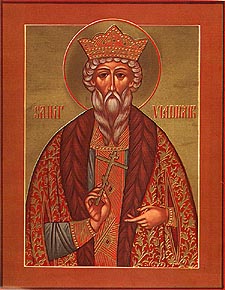|
|||
|---|---|---|---|
| This weekly bulletin insert complements the curriculum published by the Department of Christian Education of the Orthodox Church in America. This and many other Christian Education resources are available at http://dce.oca.org. | |||

The Great Prince Vladimir is called Equal to the Apostles and Enlightener of the Russian Lands. Knowing about Saint Vladimir's great work of bringing the Russian lands to Orthodox Christianity gives us part of his story. But what adds to the story's significance is to discover the people and events that God used to enable him to do his great work. Vladimir, born in 956, was not of illustrious birth; his mother was a pagan servant, and he himself was raised as a pagan. Most accounts say that he indulged in all the pleasures of pagan life without restraint, giving lavish parties, drinking and carousing with friends, and enjoying the attentions of several wives and concubines. He was also a warrior, and fought in bloody battles. He had to fight his own two brothers for control of the divided empire, and once he achieved that control he expanded the empire by military conquests. Some people look at Vladimir's important place in the history of Russian Orthodoxy and ask whether a person whose life has included so much licentious living and violence can ever rightly be declared a saint of the Church. But even leaving aside the examples of Old Testament saints from similar backgrounds, we can see how God was preparing Vladimir. First there was the influence of his grandmother Olga, who was a Christian and a strong woman. Though she was never able to convert her pagan son, Vladimir was affected by her example. Also, Christianity had quietly been spreading in the Russian lands ever since Sts. Cyril and Methodius converted the eastern Slavs years earlier. Though Vladimir continued to erect altars to the pagan gods and to follow pagan beliefs, he knew that some Christians were willing to witness decisively to their faith even when threatened. He was impressed enough by their example to investigate the teachings of Christianity, along with those of other faiths. The envoys he sent out came back with the definite opinion that Orthodoxy was the most appealing of them all, and that they "could not forget" the beauty of Orthodox worship. In the year 988, Prince Vladimir proposed an alliance with the Byzantine emperor Basil, and asked to marry the emperor's sister Anna. Basil would not agree unless the pagan prince accepted baptism, which he did. Back at home with his wife, Vladimir took his new life as a baptized Christian seriously, disciplining himself and giving his best efforts to the formation of "Orthodox Rus."
In I Corinthians 1: 1-9 Paul greets the Corinthian Christians lovingly, but in the very next verses he addresses serious problems that are already cropping up in this still-young church. The Corinthians, who were taught by Paul himself, are far from perfect, just as Saint Vladimir was. But God could and did use them both for His highest purpose: to bring people to the truth of Christian faith, and the hope of the glorious life that will never end. |
|||
